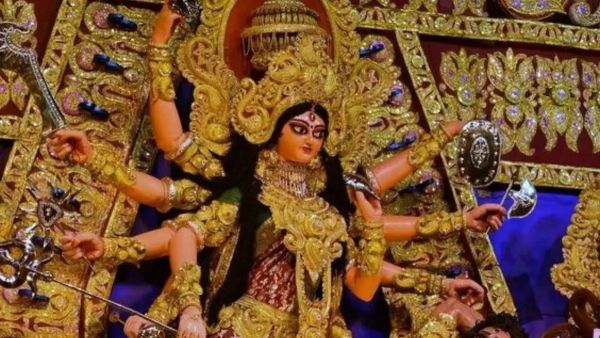
Durga Puja is a major festival of India, especially in Eastern India. This festival is dedicated to Maa Durga and it symbolizes the victory of good over evil. The specialty of this festival is that it is celebrated with many traditions. It is known by different names across India. While in North India it is called Navratri, in Tamil Nadu the festival is celebrated as Bomai Golu and in Andhra Pradesh as Bomala Koluvu.
Durga Puja Worship Tips: Durga Puja is a major festival of India, especially in Eastern India. This festival is dedicated to Maa Durga and it symbolizes the victory of good over evil. The specialty of this festival is that it is celebrated with many traditions. It is known by different names across India. While in North India it is called Navratri, in Tamil Nadu the festival is celebrated as Bomai Golu and in Andhra Pradesh as Bomala Koluvu.
Mata Rani is worshiped for 9 days and Dussehra i.e. Vijayadashami is celebrated on the 10th day. The biggest specialty of this festival to Mata Durga is that it is celebrated with some special traditions. This festival is almost incomplete without following these traditions. Today we will tell you about 10 such traditions. Let us know about the 10 traditions of Durga Puja…..
Also read: This village has a unique custom of crowning Maa Durga, devotees go to heaven waiting for the number: Jharkhand Durga Puja
You must have often seen that pandals start being set up at various places months before Durga Puja. These pandals are also decorated like pavilions. This is a special tradition, which has been going on for centuries. Without this the welcome of Mata Rani is incomplete. The biggest attraction of Durga Puja is its pandal. Adishakti resides in this pandal for 10 days. It is here that the statue of Mother Shakti is installed with rituals. All the worship programs are conducted at this place. Nowadays, committees call special types of artists from outside to decorate Mata's pandals.
There is a special tradition of offering different types of offerings to 9 different forms of Mata Rani every day for 9 days of Navratri. This offering is later distributed as Prasad. It is believed that this pleases Mother Goddess and blesses the devotees with happiness and prosperity. During this time, her favorite food i.e. ghee, jaggery, coconut, malpua is offered to the goddess.
Dhunuchi dance is considered very important in Bengal. Dhunuchi dance is a popular tradition in Bengal. In this, the dancers dance with Dhunuchi (an earthen pot in which incense and coconut are kept) in their hands. This dance is organized on the seventh day of Navratri. Dhunuchi dance is performed to please Mata Rani. There are beliefs that the goddess herself also performed this dance. Since then it has been organized in Bengal. It is believed that the mother comes to her maternal home for 9 days. In such a situation, to please them, the environment is purified with Dhunuchi.
In states like Gujarat, during Navratri, Garba-earthen pots decorated with flowers, leaves, colorful clothes and stars are installed. Four lights are lit inside it. After this, women move around it and dance happily, which is called Garba and Dandiya. This is an age old tradition.
Playing Dhak is an essential part during Durga Puja. The festive atmosphere becomes more lively with the beat of Dhak. Dhak is considered to be the musical instrument of Goddess Durga. Its sound is a way to please Goddess Durga and engage in her worship. The celebration of Durga Puja is incomplete without this. It is played during the Aarti of Mata.
Both Garad and Koriyal are white sarees with red borders, which are offered to Goddess Durga during Navratri. This saree is worn by the Goddess during Durga Puja. The red border in Garad is wider than that of Corial. Now women also wear these beautiful sarees during puja. Although earlier this saree was made only for mothers.
During Navratri, especially on Ashtami day, all the devotees chant mantras with flowers in their hands. This method is called Pushpanjali. After this, homage is paid to the Mother Goddess with these flowers. The sight of this custom is very unique. When many people offer floral tributes to the Mother Goddess together in huge pandals, it is a very beautiful sight.
The festival of Durga Puja is considered incomplete without playing vermillion. On the day of Vijayadashami, women play Sindoor Khela. They apply vermillion on the feet of the idol of Maa Durga and apply vermillion to each other. Under this tradition, after the completion of 9 days of Navratri, all the women play with vermilion at the time of farewell of the mother goddess. Unmarried girls are also included in this. Everyone happily applies vermillion to each other. This is called vermilion khela. After this, Mata Rani bids farewell to her family and returns to her in-laws' house. During this time the mother's demand is also fulfilled. At the time of farewell, Mata Rani is also fed paan and sweets.
Immersion is also a special tradition of Durga Puja. Under this tradition, after serving the Mata Rani like her daughter for 9 days, she has to bid farewell. They are taken for immersion while dancing and singing with great pomp and show. During this, the idol of the goddess is floated in clean flowing water. Only then is Durga Puja completed properly.
Many people think that Dussehra is a separate festival, but Dussehra is also a part of Durga Puja. According to mythology, on this day Mother Durga killed the demon Mahisasura. In such a situation, this festival ends with the burning of Ravana. That is why this festival is considered a sign of the victory of good over evil.